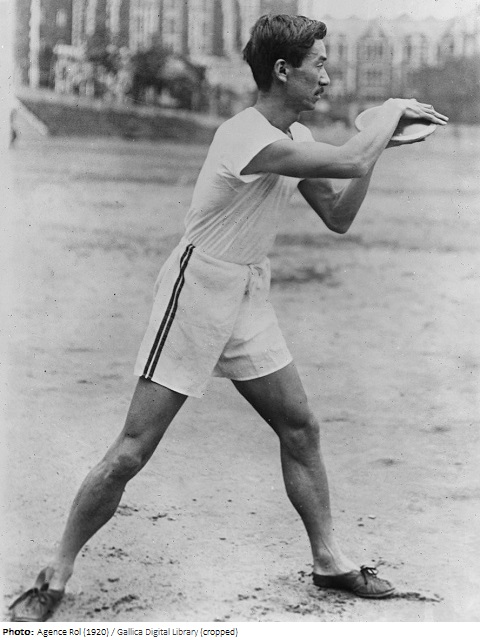Gensabulo Noguchi

Biographical information
| Roles | Competed in Olympic Games |
|---|---|
| Sex | Male |
| Full name | Gensabulo•Noguchi |
| Used name | Gensabulo•Noguchi |
| Original name | 野口•源三郎 |
| Other names | Gensaburo Noguchi, Gensaburo Maruhashi, 丸橋 源三郎 |
| Born | 24 August 1888 in Yokoze, Saitama (JPN) |
| Died | 16 March 1967 (aged 78 years 6 months 23 days) in Bunkyo, Tokyo (JPN) |
| Measurements | 169 cm / 60 kg |
| Affiliations | Juntendo University, Bunkyo (JPN) |
| NOC |  Japan Japan |
Biography
Born as Gensabulo Maruhashi, his mother died when he was still an infant. He was adopted by a relative and his name was changed to Noguchi. In 1905 Gensabulo enrolled in the Saitama Normal School and practiced tennis and kendo, achieving early success on a regional level. After graduation he was employed as a teacher but was urged to go to Tokyo Higher Normal School to specialize in physical education. Together with his senior Shizo Kanikuri he started long-distance running and took part in the national marathon trials for the Stockholm Olympics, but was not selected after placing fourth.
In 1913, at the 1st National Athletics Tournament (predecessor of Japan Athletics Championships), Noguchi competed in various events and managed to win the pole vault, clearing 2.39 m. Two years later, he graduated and moved to Matsumoto. There, he started teaching, mainly kendo and judo, and promoting sports. He won the trials in the decathlon and qualified in this event for the 3rd Far Eastern Games in Tokyo, where he was victorious as well. At the Japanese Championships he won the pole vault and took second in the pentathlon and 400 metres.
In 1918, Noguchi was appointed managing director of the Japan Sports Association and returned to Tokyo, becoming Tokyo High School’s physical education instructor. Noguchi qualified in the decathlon for the 1920 Olympics at Antwerpen and was selected as team captain and flagbearer of the Japanese team at the Opening Ceremony. Unlike many other competitors, he completed the contest despite cold and rain and a leg injury. After the Olympics, he finished his active career but continued to study sports in Western countries on the trip.
Subsequently, he coached the Japanese team at the 5th and 6th Far Eastern Games and acted as director of the Japanese Olympic Team in Paris 1924. Noguchi became responsible for the examination of physical education teachers and wrote books about track and field. One of his students was Mikio Oda, the first Japanese Olympic gold medalist. In 1925, he was appointed professor at the Tokyo High School and fought for equivalent importance of sports compared to gymnastics.
At the Amsterdam Olympics, Noguchi acted again as officer of athletics and attended the General Assembly of the International Athletics Federation (IAAF). He continued to lead the Tokyo High School Athletics Club (after 1930 Tokyo Bunri University Athletics Club). He was chairman of the history committee of the Japan Athletic Association, head coach and executive director of All Japan Athletics Federation, and Director of Dai Nippon Sports Association etc.
Noguchi retired from many posts in 1941 and was appointed secretary of the Japanese Society for the Promotion of Physical Education, later general manager of the National Athletic Training Department and of the National Defense Training Department at the Dai Nippon Sports Association. After World War II, he helped rebuilding national sports organizations and the physical education system, including the first faculty of physical education. Eventually, he was appointed dean of the Tokyo University of Education’s Faculty of Physical Education and Principal of the Tokyo College of Physical Education. He retired in 1951 but returned to the university of his native Saitama and promoted sports in the region. Again, he held various positions in sports administration on a regional and national level. During his last years he devoted himself to research on sports history in Japan.
Personal Best: Dec – 3755 (1920).
Results
| Games | Discipline (Sport) / Event | NOC / Team | Pos | Medal | As | |
|---|---|---|---|---|---|---|
| 1920 Summer Olympics | Athletics |  JPN JPN |
Gensabulo Noguchi | |||
| 400 metres, Men (Olympic) | ||||||
| Decathlon, Men (Olympic) | 12 |